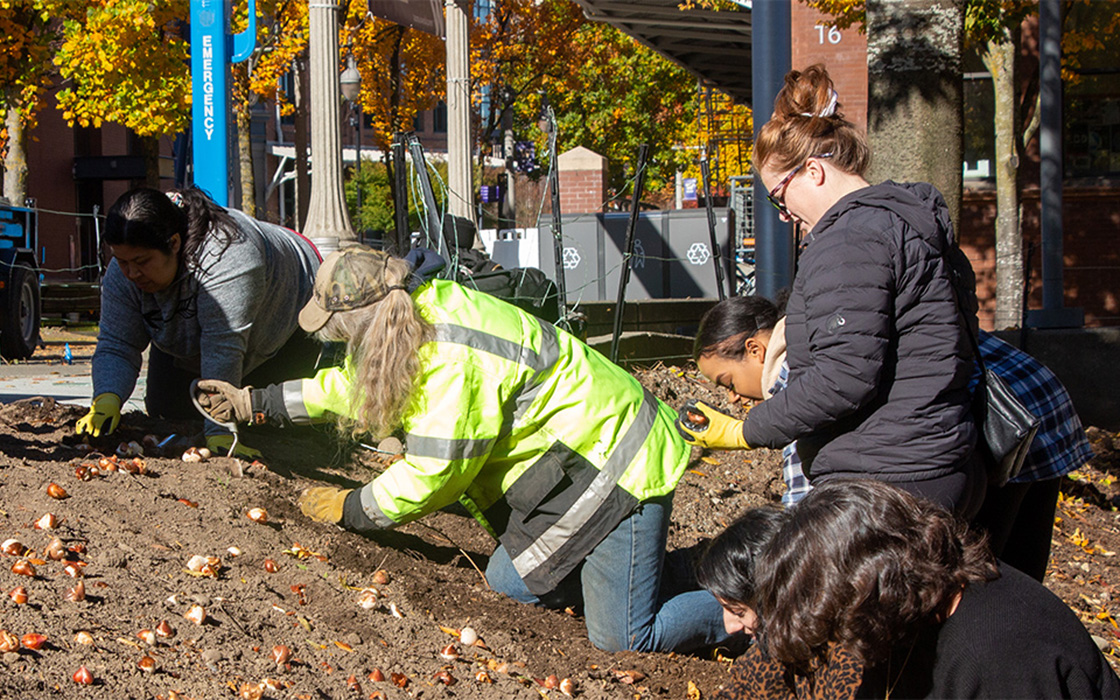
The Gardening Mindset
Students in Lauren Montgomery’s psychology class had a quarter-long collaborative learning experience helping to replant the Grand Staircase and nurture the Giving Garden.
This Section's arrow_downward Theme Info Is:
- Background Image: ""
- Theme: "light-theme"
- Header Style: "purple_dominant"
- Card Height Setting: "consistent_row_height"
- Section Parallax: ""
- Section Parallax Height: ""
Some campus construction projects stand out more than others. One that’s particularly noticeable is the renovation of the landscaping along the Grand Staircase.
Staff from Facilities Services have removed plants and bushes, tilled the earth, and replaced underground pipes in an ongoing project to replace an old, outdated irrigation system with something more efficient and sustainable.
Dr. Lauren Montgomery, a senior lecturer in the Division of Social, Behavioral and Human Sciences in the School of Interdisciplinary Arts and Sciences, saw this project not as a nuisance, but as an opportunity.
Dr. Montgomery is a strong advocate for engaged learning practices. This quarter she decided to create a campus project working both in the UW Tacoma Giving Garden and with the irrigation project. Her class spent two weeks helping to plant tulip bulbs to replace the plants that were removed, and six weeks working in the Giving Garden.

“It’s a great experience for everyone,” Montgomery said. “Students engage so much more with each other and with the class as a whole when they do this kind of work.” She explained that this engagement doesn’t end once the gardening tools are put away. “They care a lot more about the course and the course material, and are more energized and engaged in class discussions.”
Nora White, a graduate student in the Master of Interdisciplinary Arts and Sciences program, helped Dr. Montgomery facilitate these engaged learning activities for independent study credit. Over the summer she wrote prompts and reflection tools for Dr. Montgomery to use, and during the quarter she worked with the students on the engaged learning project and helped lead reflection activities.
“For my final project, I’m taking what I did for Dr. Montgomery, and taking other research and background around engaged learning, and making it into a resource binder that professors can use. So if a professor wants to do engaged learning but doesn’t know how to incorporate it, or isn’t experienced with the reflection piece, there will be a resource to help them adapt it to their class.”
White says that the experience was invaluable to her interdisciplinary education. “The experience of gardening is applicable to any discipline. Dr. Montgomery’s class is a psychology class, so in our final reflection students talked a lot about a new appreciation for the natural world, how working outside is enjoyable and invigorating, and also how social interactions are more authentic and natural when working outdoors together, and new friendships were built as a result. But if it were, say, a biology class, you could easily apply gardening there too. They could learn about soil science and apply that, for example.”
In addition to the academic advantages, Dr. Montgomery said that having students work on a project like this also helps them feel more invested in their campus. “Students will walk by in the spring and say ‘I planted those!’ It’s a way for students to give back to their community and see their impact directly.”
One of Dr. Montgomery’s students, Christopher Dennis, echoed this sentiment. “Being able to look back at how I physically changed the landscape kept me motivated, and showed me that I can make a difference on campus.”
Recent news
Main Content
Gathering Strength
News Tags on this arrow_upward Story:
- None
Main Content
UW Tacoma Enrollment up 4% for Autumn 2024
News Tags on this arrow_upward Story:
- None
Main Content
Celebrating First Gen
News Tags on this arrow_upward Story:
- None



